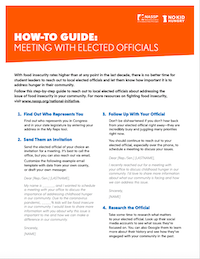With food insecurity rates higher than at any point in the last decade, there is no better time for student leaders to reach out to local elected officials and let them know how important it is to address hunger in their community.
Follow this step-by-step guide to reach out to local elected officials about addressing the issue of food insecurity in your community.
Download the How-To Guide

Use the form below to download a PDF version of the How-To Guide to print and share with your student leaders.
How-To Guide: Meeting With Elected Officials
1. Find Out Who Represents You
Find out who represents you in Congress and in your state legislature by entering your address in the My Reps tool.
2. Send Them an Invitation
Send the elected official of your choice an invitation for a meeting. It’s best to call the office, but you can also reach out via email.
Customize the following example email template with data from your own county, or draft your own message:
Dear [Rep./Sen.] [LASTNAME],
My name is ______, and I wanted to schedule a meeting with your office to discuss the importance of addressing childhood hunger in our community. Due to the coronavirus pandemic, ___% kids are food insecure in our community. I would love to share more information with you about why this issue is important to me and how we can make a difference in our community.
Sincerely,
[NAME]
3. Follow Up With Your Official
Don’t be disheartened if you don’t hear back from your elected official right away—they are incredibly busy and juggling many priorities right now.
You should continue to reach out to your elected official, especially over the phone, to schedule a meeting to discuss your issues.
Dear [Rep./Sen.] [LASTNAME],
I recently reached out for a meeting with your office to discuss childhood hunger in our community. I’d love to share more information about what our community is facing and how we can address this issue.
Sincerely,
[NAME]
4. Research the Official
Take some time to research what matters to your elected official. Look up their social media accounts to see what issues they’re focused on. You can also Google them to learn more about their history and see how they’ve engaged with your community in the past.
5. Solidify Your Talking Points
Make sure that you have all of your main points that you want to express neatly laid out. You should identify the issue, explain why it is a problem that needs to be addressed, and provide concrete actions that your elected official can take to support.
6. Have an Incredible Meeting
Have a great meeting with your elected official! With the COVID-19 pandemic, many meetings may be over the phone or Zoom rather than in person. Make sure to introduce yourself and explain why the issue matters to you!
If your elected official asks you a question that you don’t have the answer to, let them know you will provide them with an answer as a follow-up.
If you meet in person, be sure to take a picture that you can share on social media afterward.
7. Follow Up After Your Meeting
Make sure to reach out to the official and thank them for their time and their service to your community. This is a great time to recap the topics that you covered and provide any additional resources that you discussed. Following up can help foster a relationship and establish a more frequent line of communication for you in the future.
8. Share Your Meeting on Social Media
Promote your meeting! Posting about your meeting can help hold the elected official accountable for what you discussed and establish a relationship with the office.
